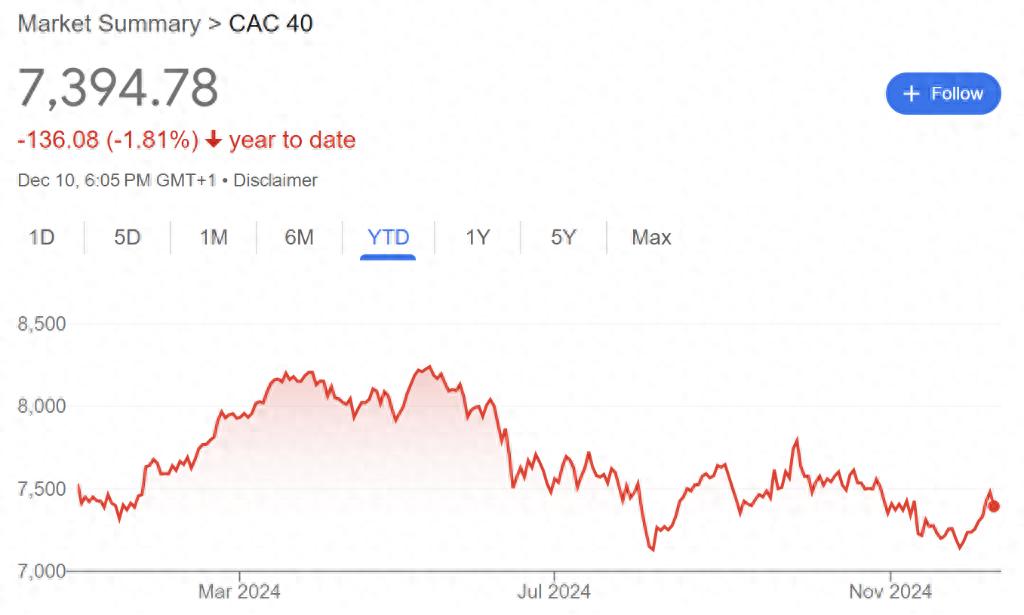The state of the French stock market has raised several eyebrows this year, particularly after trailing behind its European counterparts. As concerns mount regarding France's economic outlook, one question that investors are grappling with is whether now is the opportune time to invest in French stocks.
Recent insights from analysts at Goldman Sachs have painted a rather grim picture for the French market. According to a report released on December 10, analysts, led by Lilia Peytavin, recommend against jumping into French equities for the time being. The report underscores the market's disappointing performance, which has strikingly been the worst since 2010, with the CAC 40 index underperforming relative to the broader STOXX 600 index by a significant margin of about 10%.
This begs the question: What are the underlying factors that contribute to such an unfavorable situation? Goldman Sachs attributes the lackluster performance largely to fundamental economic conditions. Presently, the economic groundwork in France is precarious, and many may argue that the valuation of French stocks appears inflated in comparison to historical trends. As a key insight, the report suggests that for those bearish about French equities, shorting individual stocks within the domestic market may be a more strategic approach rather than taking on the broader CAC 40 index itself. This distinction arises because 50% of the revenue from stocks in Goldman’s identified list stems from domestic operations, in stark contrast to just 15% for the overall CAC 40 index.

Amid fluctuating performance, industry evaluations across France have seen a downward adjustment against their European peers. Notably, sectors such as basic resources, tourism and leisure, energy, as well as telecommunications have taken the hardest hits when it comes to valuation downgrades. Contrarily, industries like food and beverages, tobacco, and financial services have displayed resilience, witnessing a slight uptick in valuations. This dichotomy hints at an ongoing struggle within the French market landscape.
The economic narrative in France has been punctuated by political instability, notably the ousting of the government due to unresolved budget discussions and a no-confidence vote in early December. Prime Minister Michel Barnier's resignation following the tumultuous events poses additional questions regarding the future stability of French governance, and naturally, its economic policies. In this turbulent landscape, President Emmanuel Macron faces the formidable challenge of forming a new government while ensuring that certain provisions of the 2024 budget are retained to avoid a governmental “shutdown” by January 1, 2025.
Analysts have emphasized the dire economic implications that accompany the fall of the current government. The lack of a new budget will likely exacerbate the country's fiscal deficit, leading to an increase in bond yields that could deter international investors—an essential component for economic vibrancy. Goldman Sachs projects that the public deficit in France may reach about 5.5% to 6% of GDP, significantly eclipsing their initial forecasts, as well as the government’s stipulated target of 5%. The burdensome nature of such a high deficit can only hinder governmental investments in vital areas like economic development and social welfare, thereby constraining policy effectiveness.
Moreover, the forecasts concerning France's GDP growth for 2025 are bleak at best, currently estimated at a mere 0.7%. This projection falls short of market expectations and is alarmingly under the government’s aspirational threshold of 1.1%. Such anticipated sluggish growth forecasts engender a host of risks, including deteriorating corporate profits, unfavorable employment conditions, and weakened consumer markets, compounding further into the overall performance of the French stock market.
What’s particularly essential to note is Goldman Sachs’ assertion that CAC 40 does not exhibit immunity to domestic economic scenarios. Historical data highlights instances where political decisions have manifested rapid impacts on the index itself. For example, in June, subsequent to Macron announcing early elections, a notable dip of 5% in the CAC 40 index as compared to the STOXX 600 index occurred, stressing the sensitivity of the French market to shifts in political stability and decision-making. While a short-lived rebound in the CAC 40 index followed the recent parliamentary trust vote and appeared to outpace the STOXX 600 temporarily, this recovery lacks the foundational elements necessitating sustainable growth.
Adding another layer to the complexity is the composition of the French stock market, which analysts at Goldman Sachs attribute partly to its industry frameworks. The CAC 40 index heavily features consumer goods and services, particularly luxury brands and energy sectors, which collectively account for a hefty 28% of its market cap—twice that of the 11% represented in the STOXX 600. Such heavy reliance on just a few sectors raises questions about the resilience of CAC 40 in the face of adverse market conditions.
As Goldman Sachs' analysis dissects the performance of the CAC 40 thus far in the year, negative earnings per share (EPS) revisions emerge as the critical detractor, overshadowing potential valuation contractions or heightened risk premiums. This emphasizes the imperative nature of EPS forecasts on investor sentiment and market performance. Given that the current valuations of CAC 40 equities are perceived to be on the higher end—both in absolute terms and historically—it begs the question of whether investors may face disproportionate risks against inflated expectations.
As we stand at a crossroads in the dynamics of investing in France, it becomes imperative for investors to proceed with utmost caution. The intertwined complexities of politics, economic fundamentals, and sectoral performances intricately weave a narrative that suggests, at least for now, that the French stock market may not present an inviting opportunity for investment.